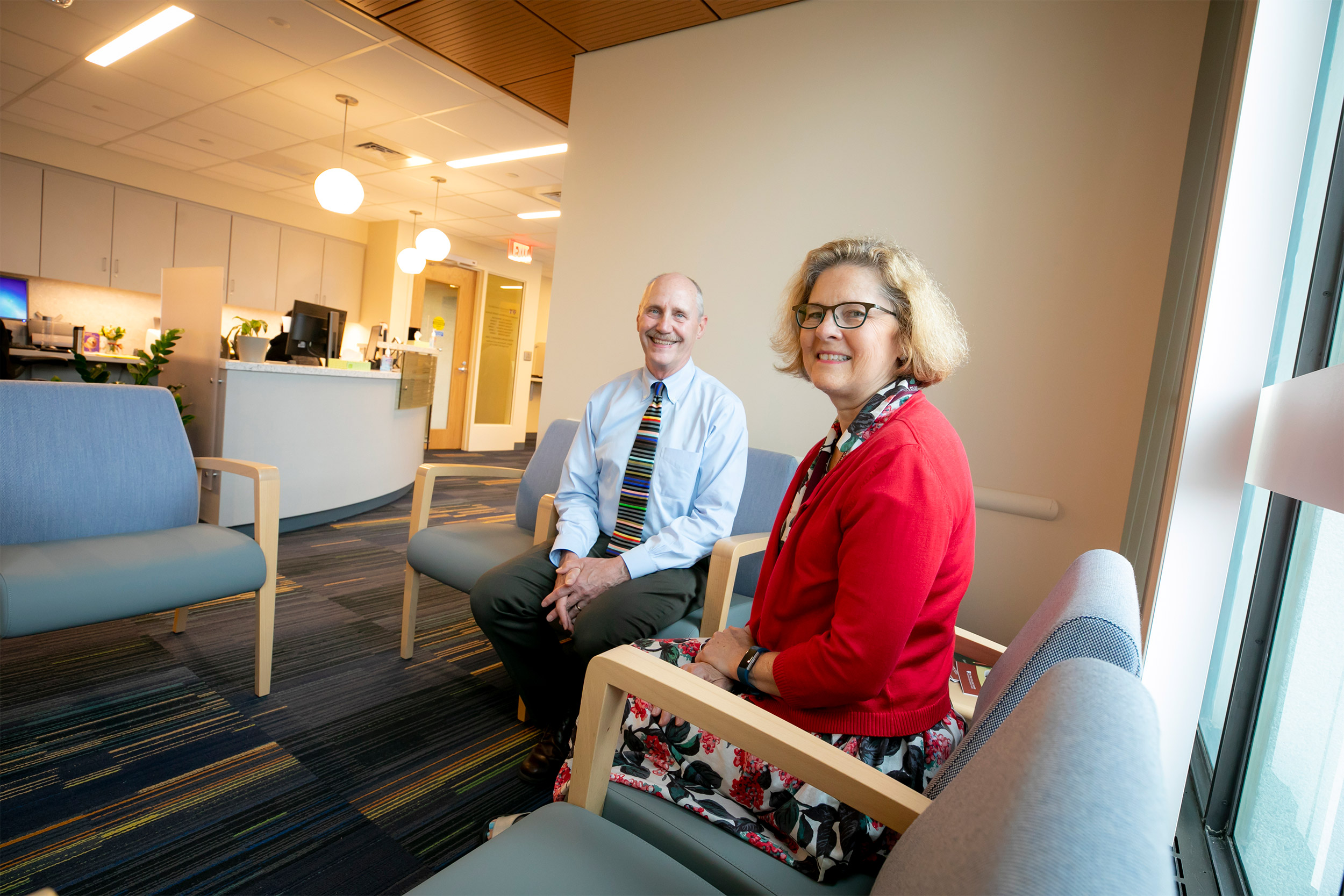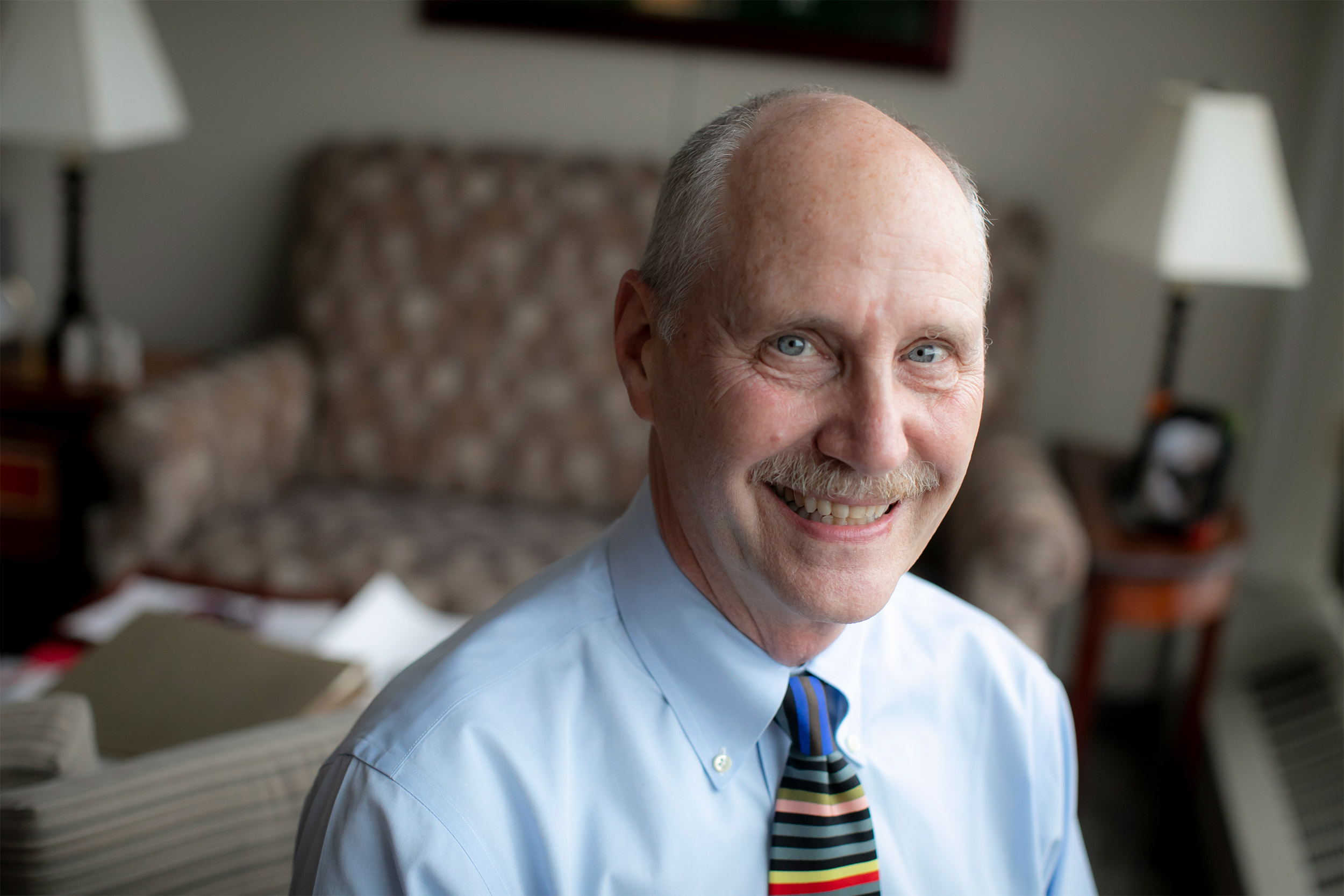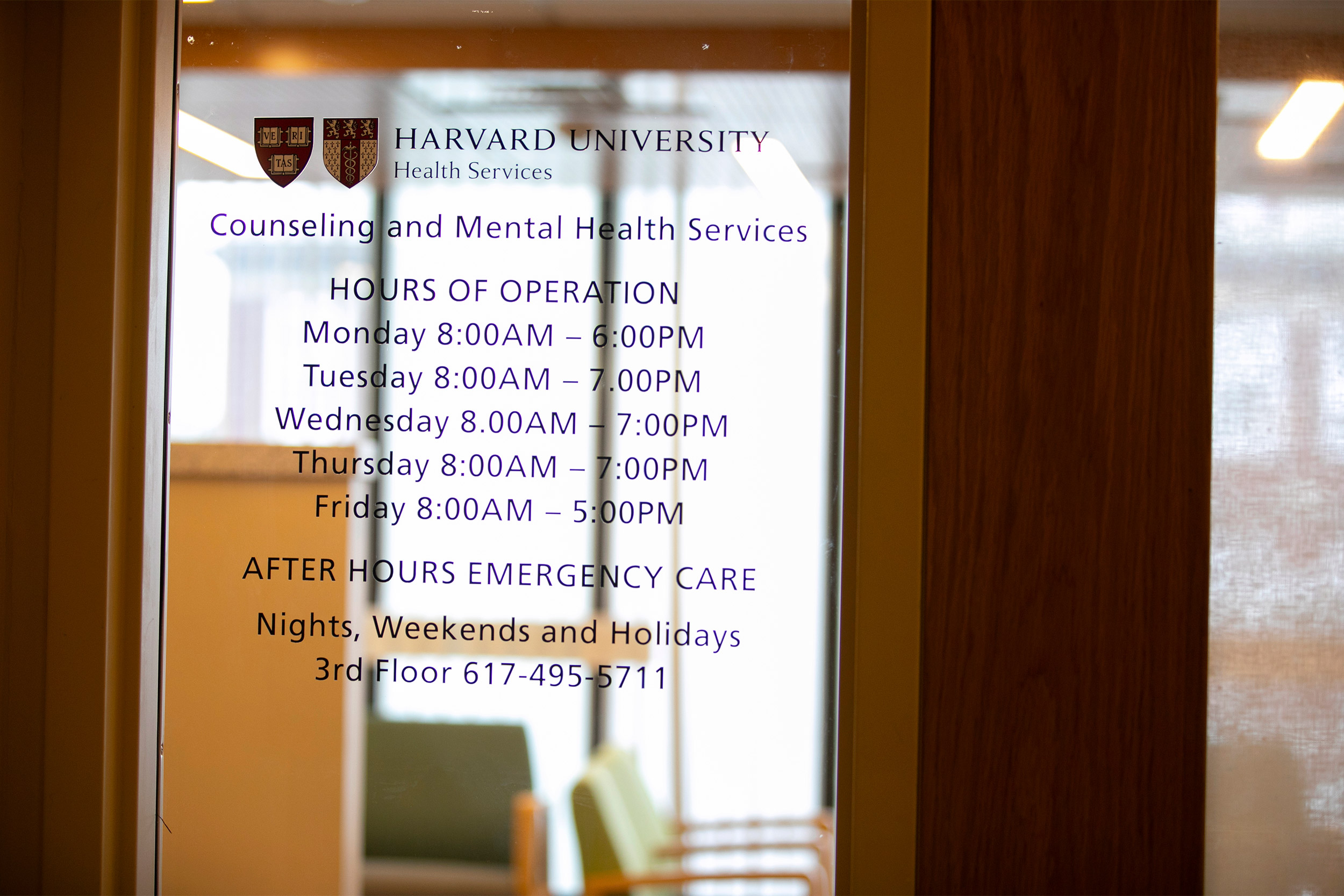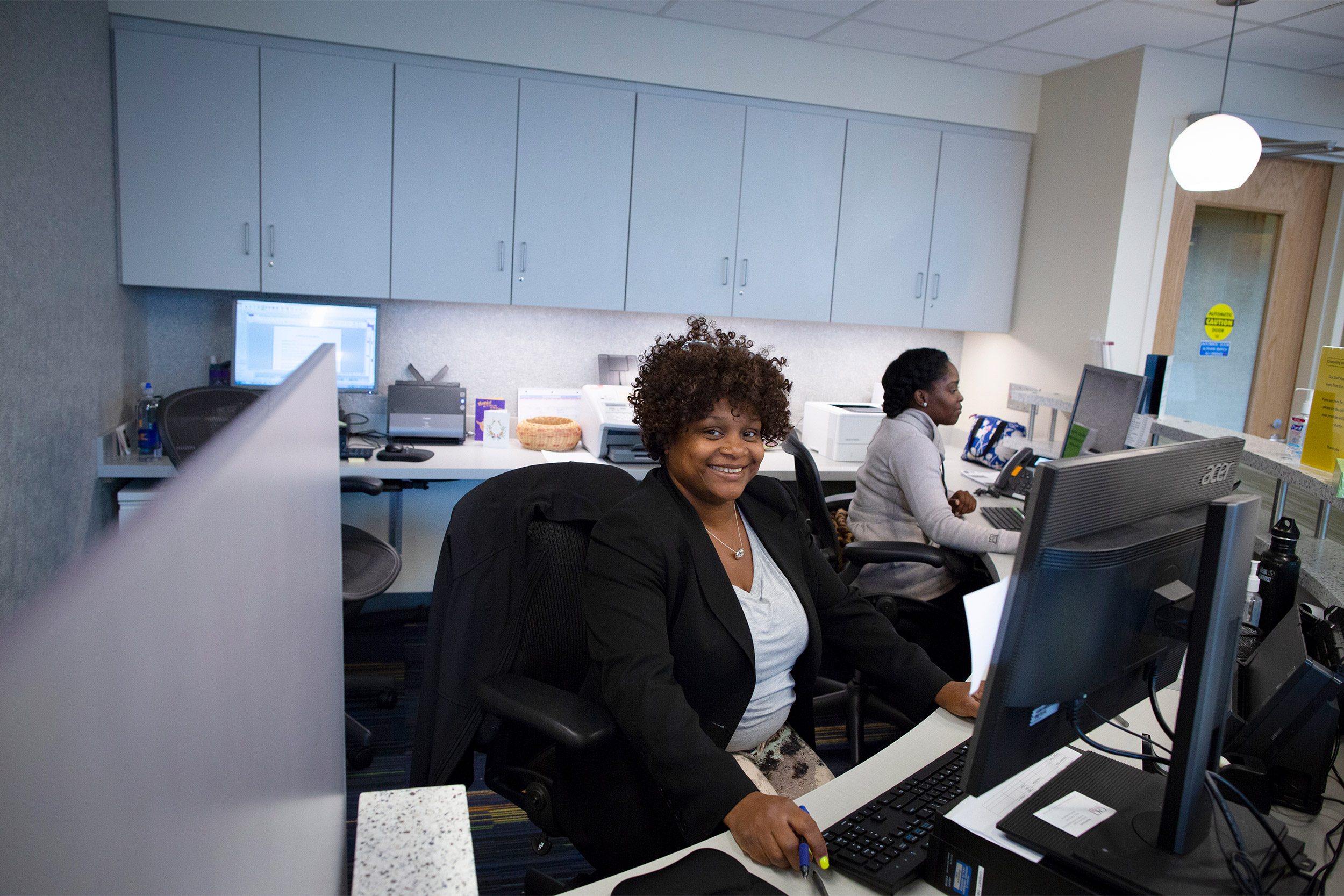
Paul Barreira (left) and Barbara Lewis in the Counseling and Mental Health Services’ newly expanded and renovated space on the fourth floor of the Smith Campus Center.
Rose Lincoln/Harvard Staff Photographer
Expanded Counseling and Mental Health Services
Barreira, Lewis discuss new space, and how it helps broaden their mission
Harvard University’s Counseling and Mental Health Services (CAMHS) works collaboratively with students and the University to support those experiencing some measure of distress in their lives. This academic year, CAMHS has significantly increased its resources by adding an expanded and modernized space on the fourth floor of the Smith Campus Center, expanding its staff 25 percent since spring, and launching several initiatives to serve students better no matter where they may be on campus.
The Gazette recently sat down with Paul Barreira, director of Harvard University Health Services (HUHS), and Barbara Lewis, chief of Counseling and Mental Health Services, to learn more about the design of the new space, as well as CAMHS’ budding community health model, which features opportunities to speak with counselors in novel settings, in-person and online.
Q&A
Paul Barreira and Barbara Lewis
GAZETTE: Why was it important for CAMHS to have a new space?
BARREIRA: About three years ago when we made plans to close the Stillman Infirmary, we decided to reinvest money and resources in a space that would provide better, more critical services to a greater number of students. We focused this reinvestment on CAMHS specifically, and we’ve doubled the space available for individual and group therapy sessions, while also dramatically improving upon the size and feel of our waiting room area.
You can’t overemphasize the impact that our new waiting area conveys. When we thought about its design, we talked about having a wow factor, and I think we’ve captured that here. It’s a beautiful, large, comfortable waiting room with great views, and it’s just so different from what we had before, which was more of a closed-in space resembling a crowded bus stop.
LEWIS: There are two separate areas in the waiting room meant to facilitate more privacy for students, and we renovated the front desk area where students check in. There are now six accessible kiosks, all of which accommodate individuals with disabilities. We’ve also been able to add seven new offices and two small group rooms throughout the fourth floor of the Smith Campus Center Clinic. The CAMHS team has grown significantly over the past two years. We now feature over 50 clinicians, up from about 40 just this past spring, and these additional offices and group therapy rooms have been instrumental in our ability to accommodate our new colleagues, and the corresponding expanded services to the student body that they provide.
“Many of the ways that [Counseling and Mental Health Services] touches the lives of students across campus are not clinical in nature, but educational or prevention-based …,” says Paul Barreira, director of Harvard University Health Services.
Rose Lincoln/Harvard Staff Photographer

GAZETTE: Let’s talk more about the new suite of services being offered by CAMHS. In addition to providing more space within HUHS to meet with students in a clinical setting, you’re also ramping up your efforts to meet students where they are.
BARREIRA: CAMHS has adopted a community health model to increase the ways in which we can have a positive impact on Harvard students, who may come into contact with CAMHS through a diversity of activities, such as peer student education groups or peer counseling groups, or through meetings with proctors and tutors at the College. Many of the ways that CAMHS touches the lives of students across campus are not clinical in nature, but educational or prevention-based, and sometimes these interactions may lead to formal treatment.
Another important point to underscore is that originally CAMHS was called student mental health services, and we purposely changed it to counseling and mental health services because a counseling center is available for students who have any kind of adjustment problems; not just in terms of needing medication or psychotherapy. The shift in name also occurred with the desire to increase the space: We’re more than just student mental health services. The component of counseling is important, and the scope of what we provide is broad.
LEWIS: This broad scope, critically important to our mission, also creates challenges, especially with regard to access. We can see 130 to 150, sometimes more, new students every week, and we need to provide an initial 30-minute assessment for each of them. Last spring, we began piloting some of our new initiatives that focus on changing the way in which students get into CAMHS. The president’s office also provided us with two new full-time staffers to coordinate these points of access and refer students both within and outside of the Harvard community, and it has already made a big difference. Our new goal aims to have students seen or spoken to on the phone for their first assessment within 48 hours of first seeking out care, and we’re able to offer more consistent follow-up visits, usually on a weekly or biweekly basis, for those students who continue to receive short-term clinical care at CAMHS. For students for whom a longer-term treatment course is recommended, we connect them with therapy options outside of Harvard in a timely manner.
Our new program “Let’s Talk,” which we piloted this past spring, places counselors out in the community in various locations across Harvard. [You can find those locations and corresponding hours here.] We recognize that a large percentage of the students we serve come to CAMHS one to two to three times, and don’t necessarily need clinical care. At “Let’s Talk” locations, students can stop by and have an anonymous conversation about whether or not they might need further counseling, they can ask questions regarding a friend, or even simply solicit the advice of a professional. This fall, we’re offering 20 hours of “Let’s Talk” over five days in several locations. Our program follows a similar “Let’s Talk” initiative launched at Cornell 10 years ago. The program is free of charge, like all of CAMHS’ services, and no appointment is necessary.


In conjunction with the redesigned physical space, the patient portal now allows students to schedule consultations online, 24-7. Valerie Rice (left) and Ronnita Langham are in the renovated reception area.
Stephanie Mitchell/Harvard Staff Photographer
GAZETTE: CAMHS also partnered this year with the iHope network, a platform that provides both person-to-person and group therapy via devices such as smartphones, tablets, and computers. Tell us more about your decision to provide iHope as an option for students at Harvard.
LEWIS: We began a pilot of iHope last fall, when about a dozen students decided to sign up for one-to-one counseling sessions via the platform, which is fully covered by student health insurance. In the spring, we worked directly with iHope to develop several telehealth groups as well, conducted in the evenings, and which were skills-based. Students were able to sign up to participate in online interactive group workshops or simply have access to various modules to work with on their own time, covering topics such as “sleeping soundly,” “mending your mood,” “calming the worried mind,” “organizing yourself,” and “perfectionism.” About 90 students signed up and used the modules; fewer participated in the groups.
We’ve again contracted with iHope for the fall and added other groups in addition to the existing offerings, including a “transition to Harvard” group. Feedback to date has been overwhelmingly positive. These skills-based groups offer students the chance to access services from their own environment during times when we may not be open. For students in distress, mental health clinicians are available for same-day appointments, and a mental health clinician is on call 24 hours a day.
GAZETTE: What are some other ways that CAMHS is increasing access points for Harvard students?
LEWIS: We’re very much committed to making it fast and easy for students to come in contact with our services. We recently redesigned our patient portal so that students can more easily schedule consultations online, 24-7. Students appreciate how easy it is to compare their schedules with that of their therapists, and I know this is also important from the point of view of tutors, proctors, and deans, who, if they’re sitting with a student who is in distress at 1 in the morning, they can go onto the portal together to ensure that an appointment is booked. This can be reassuring from the perspective of both the student and the person supervising. And, related to the portal, we’re working on a new website to be more dynamic, welcoming, and up-to-date with news and events, which we hope to launch later this fall.
BARREIRA: Another way in which we’re hoping to better reach, and serve, our students, is through our commitment to growing the diversity of our staff. With the support of the University, we’ve made some great strides and hope to continue to do so moving forward.
LEWIS: Half of our clinicians represent some form of diversity, including 11 clinicians of color and staff members representing BGLTQ populations. On our permanent staff, several therapists speak Spanish, and we have clinicians who speak German, French, Portuguese, Farsi, and Chinese. We’re always looking to provide the best possible care at CAMHS, for all members of the Harvard community who need it.
For more information about CAMHS’ initiatives, visit https://huhs.harvard.edu/services/counseling-and-mental-health, or call 617.495.2042 or 617.495.5711 after hours.




